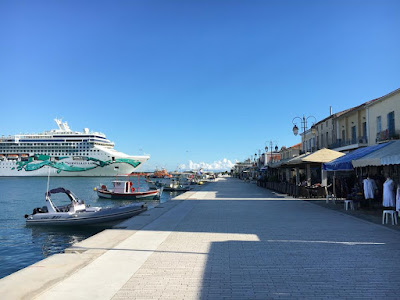«Κοινωνική ευθύνη-Αλληλεγγύη-Εθελοντική προσφορά»
Ξεπέρασε κάθε προσδοκία σε απήχηση και
συμμετοχή, η 2η Συνάντηση Activewomen - Δραστήριες
Γυναίκες - Πάτρα 2016, που πραγματοποιήθηκε το Σάββατο 22
Οκτωβρίου.
Περισσότερα από 300 άτομα είχαν γεμίσει ασφυκτικά επί
τέσσερις και πλέον ώρες την αίθουσα του ξενοδοχείου «Αστήρ» παρακολουθώντας
το πλούσιο πρόγραμμα με αμείωτο ενδιαφέρον. Εισηγήτριες και
εισηγητές, από δέκα ελληνικές πόλεις, σχολιαστές και
κοινό, συμμετείχαν σε έναν ιδιαίτερα ενδιαφέροντα διάλογο, με επίκεντρο
τις Ελληνίδες πρωταγωνίστριες της νέας οικονομίας.
Ήταν μια υψηλού επιπέδου, από πλευράς οργάνωσης και
θεματικού περιεχομένου πρωτοβουλία, που σύμφωνα με αντικειμενικές εκτιμήσεις,
καθιερώνεται πλέον ως ετήσιος περιφερειακός θεσμός, με πανελλήνια και όχι μόνο απήχηση,
αφού πλέον θα ενταχθεί -όπως ανακοινώθηκε- και στο Παγκόσμιο Δίκτυο
Επιχειρηματικότητας.
Σημαντικά πρόσωπα από όλο το φάσμα των κοινωνικών και
επαγγελματικών δραστηριοτήτων προερχόμενα από δέκα και πλέον πόλεις της χώρας
όπως Αθήνα, Θεσσαλονίκη, Ιωάννινα, Μεσολόγγι, Κέρκυρα, Αίγιον, Καλαμάτα,
Αρχαία Ολυμπία και Μεσσήνη, συμμετείχαν στην 2η Διαπεριφερειακή Συνάντηση
Activewomen- Δραστήριες Γυναίκες.
Η δεύτερη κατά σειρά αυτή Συνάντηση με κεντρικό θεματικό
άξονα την «Κοινωνική ευθύνη-Αλληλεγγύη-Εθελοντική προσφορά» είχε ως πυρήνα τον
παράγοντα άνθρωπο, δηλαδή την διαπροσωπική γνωριμία, προσέγγιση και
ενημέρωση με ανταλλαγή απόψεων και εμπειριών, σε σημαντικά επαγγελματικά
αλλά και ευαίσθητα κοινωνικά ζητήματα, όπου καταλυτική υπήρξε και παραμένει η
παρουσία και παρέμβαση της κάθε γυναίκας.
Η 2η Συνάντηση Γυναικών Activewomen, μετά την
σημαντική απήχηση και τον θετικό απολογισμό της πρώτης διοργάνωσης τον Οκτώβριο
2015, φιλοδοξεί να καθιερωθεί ως νέος ετήσιος περιφερειακός θεσμός για την
Πάτρα και την Ελλάδα στο πλαίσιο του παγκόσμιου Κινήματος Επιχειρηματικότητας.

Στην ομάδα σχολιαστών που συγκροτήθηκε στα πλαίσια της
Συνάντησης, συμμετείχε η Βάσω Χαριτοπούλου, ιδρύτρια & επικεφαλής
του Κέντρου Τοπικής Ανάπτυξης «Διώνη» Αρχαίας Ολυμπίας, μαζί με τους: Βίκυ
Σφακιανάκη, δημοσιογράφος (Αθήνα), Πέτρος
Μαντάς, αντιπρόεδρος Ινστιτούτου Ανάπτυξης Δυτικής Ελλάδος (ΙΝΑΔΕ), μέλος
ΔΣ Συνδέσμου Βιομηχανιών και Επιχειρήσεων Πελοποννήσου και Δυτικής
Ελλάδος, Βαγγέλης Τσιμπλοστεφανάκης, σύμβουλος επιχειρήσεων, στέλεχος
της Διαδικασία ΑΕ, Θεόδωρος Δούρος, διευθύνων σύμβουλος της Dur ΑΕ,
μέλος ΔΣ Συνδέσμου Βιομηχανιών και Επιχειρήσεων Πελοποννήσου και Δυτικής
Ελλάδος Θανάσης Κυριαζόπουλος, στέλεχος εταιρείας Συμβούλων
Επιχειρήσεων Ανέλιξη (Καλαμάτα), Πένυ Βεργάδου, στέλεχος εταιρείας
ερευνών Data RC, Έφη Σιαïνη, αρχιτέκτων Μηχανικός Ε.Μ.Π. πρόεδρος
Ομοσπονδίας Συνδέσμου Νέων Επιχειρηματιών Δυτικής Ελλάδος, Λιολιώ
Κολυπέρα, πρόεδρος Συλλόγου Άλμα Ζωής Αχαΐας, Έφη Αναλυτή, πρόεδρος
Συλλόγου Νέων Καλλιτεχνών Πάτρας.

Στις εναρκτήριες ομιλίες τους, τόσο ο
Κωνσταντίνος Μίχαλος, πρόεδρος της Κεντρικής Ένωσης Επιμελητηρίων και
του ΕΒΕΑ, όσο και η ευρωβουλευτής της ΝΔ
Μαρία Σπυράκη αναφέρθηκαν στη θέση της γυναίκας στην οικονομία σήμερα
και τόνισαν πως όταν η επιχειρηματικότητα ευημερεί, μπορούν να αναπτυχθούν και
οι τοπικές κοινωνίες.
Κεντρική ομιλία έγινε και από την κυρία Λιάνα Γούτα,
πρόεδρο Γυναικών Μάνατζερ και Επιχειρηματιών τμήματος Μακεδονίας της
ΕΕΔΕ, διευθύντρια Ενεργειακής Πολιτικής και Διεθνών Σχέσεων
Ομίλου Ελληνικά Πετρέλαια AE.
Περισσότερες από 20 γυναίκες, επιχειρηματίες,
στελέχη επιχειρήσεων, επιστήμονες αλλά και πρόσωπα
της διπλανής πόρτας, τοποθετήθηκαν με τόλμη, ειλικρίνεια αλλά και
γλαφυρότητα στο τρίπτυχο "Επικοινωνώ Συμμετέχω -
Προσφέρω". Ταυτόχρονα αποδείχθηκε ότι οι γυναίκες είναι αυτές
που πρωτοπορούν και κρατούν τα σκήπτρα στους ευαίσθητους τομείς της αλληλεγγύης
και του εθελοντισμού.
Αποκορύφωμα της Συνάντησης αποτέλεσε η ενότητα «Επιχειρηματικότητα
και Κοινωνική Ευθύνη», που συνδιοργανώθηκε με την Ένωση Γυναικών Πάτρας
(Ε.ΓΥ.ΠΑ.) και στην οποία συμμετείχαν οι κυρίες Ρία Πρίνου, ιδρύτρια
Επιχειρήσεων Πρίνου, Βούλα Σαραντάρη, επιχειρηματίας, Chairman of Recruiting Community for New Members – Guiding Lion,
ιδρυτικό μέλος Λέσχης Lions, Άννα Μαρία Ρογδάκη, Πρόεδρος Ε.ΓΥ.Πάτρας, Τέτη Μαμούρη,
τομεάρχης Εταιρικής & Κοινωνικής Ευθύνης Γραφείου
Διοίκησης ΔΕΔΔΗΕ Α.Ε, Δέσποινα Γαβαλά, επιχειρηματίας και
Βίκυ Σφακιανάκη, δημοσιογράφος.
Στη μεγάλη επιτυχία της Συνάντησης, συνετέλεσαν επίσης οι
διάφορες ειδικού βάρους παρεμβάσεις και εκπλήξεις όπως:
-Η απονομή τιμητικών διακρίσεων στις κυρίες Σίσσυ-
Αυγερινού Λιούτα, οδοντίατρο και Γωγώ Καραλή, δημοσιογράφο.
-Η παρουσία της πατρινής πρωταθλήτριας κολύμβησης Νόρας Δράκου.
-Οι ευχάριστες σύντομες παρενθέσεις κατά την έναρξη
και το τέλος από μουσικά σύνολα του Ωδείου Paganini.
-Η διανομή διαφόρων αναμνηστικών στους
παρισταμένους.
-Η λειτουργία παράλληλα Έκθεσης ενημερωτικού
χαρακτήρα για την προβολή κοινωνικών και άλλων φορέων, με έντυπο και
οπτικοακουστικό υλικό.
Αίσθηση επίσης προκάλεσε, στο πλαίσιο της
ενότητας «Ιστορίες επιτυχίας Γυναικείας Επιχειρηματικότητας», η παρουσίαση
και ζωντανή επίδειξη δημιουργιών γυναικείων ενδυμάτων από το
πατρινό fashion brand Maraboo, που έχουν δημιουργήσει η
Έφη Σιαίνη και η Αλεξία Παππά.
Οργανωτής της Συνάντησης ήταν το Κέντρο
Επικοινωνίας και Προβολής με την ενεργό συνεργασία του
Επιμελητηρίου Αχαΐας (ομιλητής ήταν ο πρόεδρος Πλάτων Μαρλαφέκας), του
Συνδέσμου Επιχειρήσεων και Βιομηχανιών Πελοποννήσου- Δυτικής
Ελλάδος (ομιλητής ήταν το μέλος του Δ.Σ. Θόδωρος Δούρος), της
Ομοσπονδίας Ελληνικών Συνδέσμων Νέων Επιχειρηματιών (πρόεδρος η
Έφη Σιαίνη), του Ινστιτούτου Ανάπτυξης Δυτικής Ελλάδος (εκπροσωπήθηκε από
τον επιχειρηματία Πέτρο Μαντά), της Ένωσης Γυναικών Πάτρας (Ε.ΓΥ.ΠΑ.) και
του Συλλόγου Γυναικών με Καρκίνο Μαστού Νομού Αχαΐας «'Αλμα Ζωής». Συντονιστής
ήταν ο δημοσιογράφος Ανδρέας Α. Βρής, πλαισιωμένος στο προεδρείο
από την Κίττυ Πανουργιά, Ευρωπαία Πρέσβειρα Γυναικείας
Επιχειρηματικότητας και Σοφία Λυμπεροπούλου, οικονομολόγο.
Επίσης στη Συνάντηση συμμετείχαν οι Λούμπιτσα Κμέτοβα, στέλεχος
τουριστικών επιχειρήσεων (Κέρκυρα), Μαργαρίτα Μποβιτσέλι, πρόξενος Ιταλίας
στην Μεσσηνία, Κατερίνα Βέργη, οικονομολόγος, υπεύθυνη ΚΕΔΙΒΙΜ
1 Εκπαιδευτικού Συγκροτήματος Βέργη, Παναγιώτα
Κουτσούκου, αντιπρόεδρος Συνεταιριστικής Επιχείρησης (ΚΟΙΝ. Σ.ΕΠ.)
Οικομουσείο Ζαγορίου, μέλος της αναπτυξιακής επιχείρησης Ζαγορίου, Μάντυ
Αποστολοπούλου, πρόεδρος του φιλανθρωπικού σωματείου “Save an angel
Patras”, Dr Αθηνά Χριστοπούλου, παθολόγος/ογκολόγος,
Διευθύντρια Ε.Σ.Υ. Ογκολογική Μονάδα Γ.Κ.Ν. Πατρών, Πηνελόπη
Λαμπούση, φιλόλογος, πρόεδρος Παμμεσσηνιακού Συνδέσμου Πατρών.













